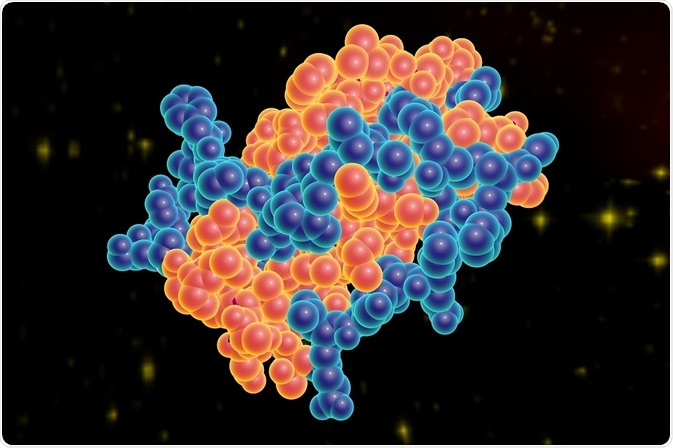Leptin is a hormone that is produced in adipocytes and exerts its effects on the brain and several other peripheral tissues. It plays a crucial role in regulating endocrine functions and controlling energy expenditure.
 Credit: Katryna Kon/Shutterstock.com
Credit: Katryna Kon/Shutterstock.com
Apart from the adipose tissue, lectin is also expressed in other tissues including placenta, ovary, skeletal muscle, pituitary gland, and lymphoid tissue. Leptin regulates food intake and plays key role in energy expenditure, metabolism, neuroendocrine axis, and immune function.
Circulating leptin concentrations are closely associated with Body Mass Index (BMI) and total body fat. Changes in calorie intake result in the fluctuation of leptin levels. During starvation, leptin levels markedly decrease, whilst increased leptin levels are observed in overfed and obese states. When leptin binds to its specific receptor in the brain, it results in the activation of multiple signal transduction pathways.
Leptin receptors
The wide distribution of leptin receptors can explain the pleiotropic biological effects of leptin. Leptin receptors (OB-R) are structurally similar to the class I cytokine family receptors (the receptors of IL-2, IL-3, IL-4, IL-6, IL-7, LIF, granulocyte colony-stimulating factor, growth hormone, prolactin and erythropoietin).
Characteristic extracellular motifs of four cysteine residues are present in leptin receptors. They contain the amino acid sequence WSXWS (Trp-Ser-Xaa-Trp-Ser) and fibronectin type III domains. Alternatively splicing of RNA results in various isoforms, designated as OB-Ra, OB-Rb, OB-Rc, OB-Rd, OB-Re and OB-Rf. An extracellular domain of more than 800 amino acids, a transmembrane domain of 34 amino acids, and a variable intracellular domain is common characteristic of all isoforms.
Intracellular signaling pathways
The binding of leptin to its specific receptor results in activating a number of intracellular signaling pathways in the central nervous system and peripheral tissues, including:
- Janus Kinase 2 (JAK2)/Signal Transducer and Activator of Transcription 3 (STAT3)
- Insulin Receptor Substrate (IRS)/Phosphatidylinositol 3 Kinase (PI3K)
- SH2-containing Protein Tyrosine Phosphatase 2 (SHP2)/Mitogen-activated Protein Kinase (MAPK)
- 5' Adenosine Monophosphate-activated Protein Kinase (AMPK)/ acetyl-CoA carboxylase (ACC)
A suppressor of cytokine signaling 3 (SOCS3) can induce the termination in leptin signaling cascade. This pathway is regulated by both positive (eg. SH2B1) and negative (e.g., SOCS3 and PTP1B) regulators.
Multiple Leptin Signaling Pathways
Leptin acts as a multifunctional hormone cytokine and involved in several cellular functions throughout the whole body. Through its ubiquitous receptors, leptin interacts with several signaling factors and cross-talks with various signal transduction pathways.
The JAK/STAT pathway
Family members of JAK/STAT pathway include four non-receptor tyrosine kinases (JAKs) and seven 85–95 kDa transcription factors (STATs). Primarily, the JAK/STAT pathway is activated by interferons, interleukins or other cytokines whose receptors lack intrinsic kinase activity.
Activated JAK subunita transphosphorylate each other on tyrosine residues of the OB-R. STAT3 binding and activation of STAT1, STAT5 and STAT6 occur because of OB-R signaling by leptin. Through the JAK/STAT pathway leptin controls the body weight and immune cells.
The Phosphatidylinisitol-3-kinase (PI3K) pathway
PI-3 kinase pathway is activated when leptin stimulates phosphoinositide (PI) 3-kinase. It has been found that leptin can act through some of the components of the insulin signaling cascade. The activation of PI3k involves most insulin-dependent actions. When PI3K gets stimulated it activates PtdIns P3-dependent serine/threonine kinases including PDK1 (phosphoinositide-dependent kinase 1) which plays a crucial role in subsequent downstream signaling.
The Mitogen-activated protein kinase (MAPK) pathway
Several stimuli including leptin can activate the MAPK pathway. There are two different ways to activate MAPK cascade. These are tyrosine phosphorylation of JAK2 receptor-associated activation and activation that occurs independently of receptor phosphorylation. TheMAPK pathway is associated in mediating leptin's anorexigenic action.
5'-AMP-activated protein kinase (AMPK) pathway
An increased AMP/ATP ratio activates 5'-AMP-activated protein kinase (AMPK). Acetyl-CoA carboxylase (ACC) is an important enzyme in fatty acid biosynthesis which is inactivated by AMPK. Leptin plays a role in inhibiting AMPK in multiple regions of the hypothalamus. Stimulation of hypothalamic ACC by leptin via inhibition of AMPK results in decreased food intake and weight gain.
Other pathways
- Suppressor of cytokine signaling-3 (SOCS3): Expression of SOCS3 is also stimulated by leptin and this negative feedback mechanism prevents overactivation of leptin-signaling pathways.
- Protein tyrosine phosphatase 1B (PTP 1B): PTP1B also acts as a negative regulator and inhibits leptin signaling.
Further Reading
Last Updated: Feb 26, 2019